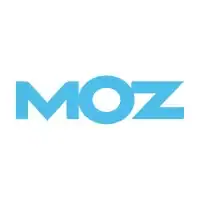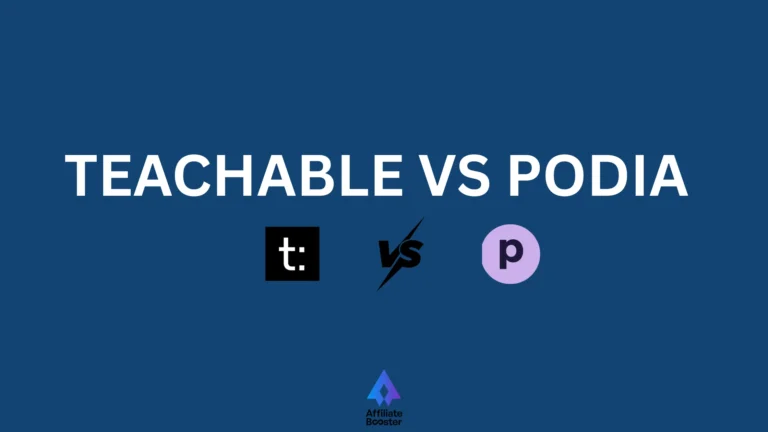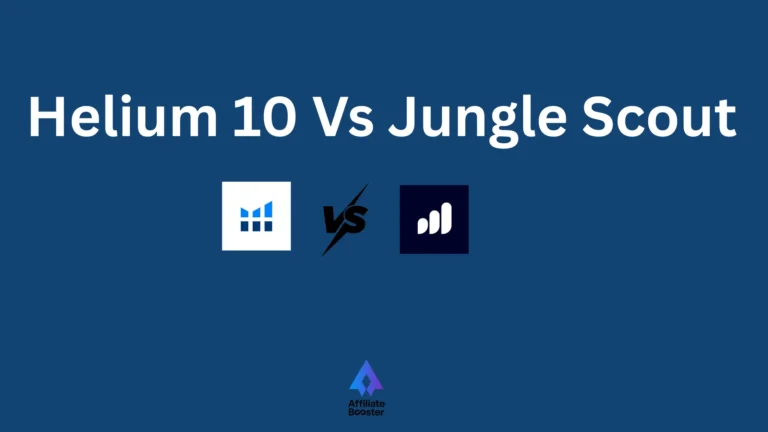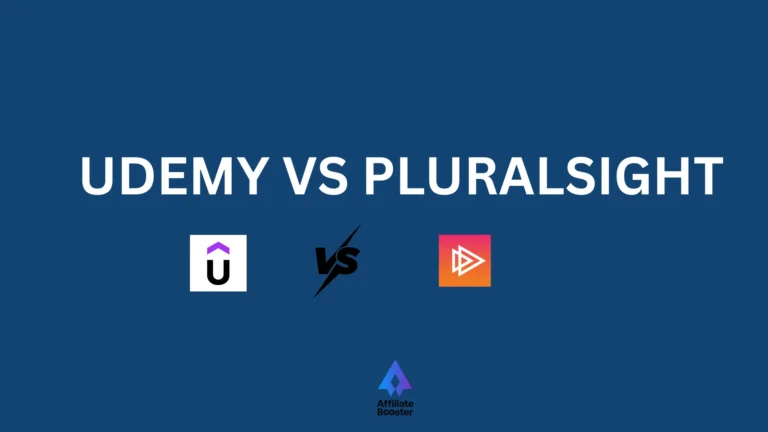Best For | SEO professionals who want to track progress and stay motivated with competitive goals. | |
Pricing | Starts at $117.33/month | Starts at $39/month |
Features | Progress tracking | |
Pros | Tracks improvements and sets goals | Clear progress tracking |
Cons | Can be overwhelming with data overload | Less emphasis on competitive research |
When comparing Semrush and Moz, two of the top SEO tools, it’s like picking between two powerful allies for your digital marketing.
Both tools help you improve your website, increase your rankings, and stay ahead of the competition.
But how do they stack up in terms of features, ease of use, and overall value?
In this Semrush vs Moz comparison, we’ll get into the key details of each tool, exploring their features and comparing how they perform in different areas.
Overview of Semrush

Semrush started its journey in 2008 as a browser extension called SeoQuake. Over the years, it has transformed into a comprehensive digital marketing suite, offering tools for SEO, SEM, PPC, social media, content marketing, and more.
With a focus on providing data-driven insights and in-depth analytics, Semrush is a tool used by marketers worldwide to conduct competitive research, improve website performance, and plan content strategies.
Semrush is renowned for its keyword research capabilities, backlink analysis, and overall versatility. It offers tools like Keyword Magic, Site Audit, Traffic Analytics, and much more, making it a one-stop shop for SEO professionals.
Overview of Moz
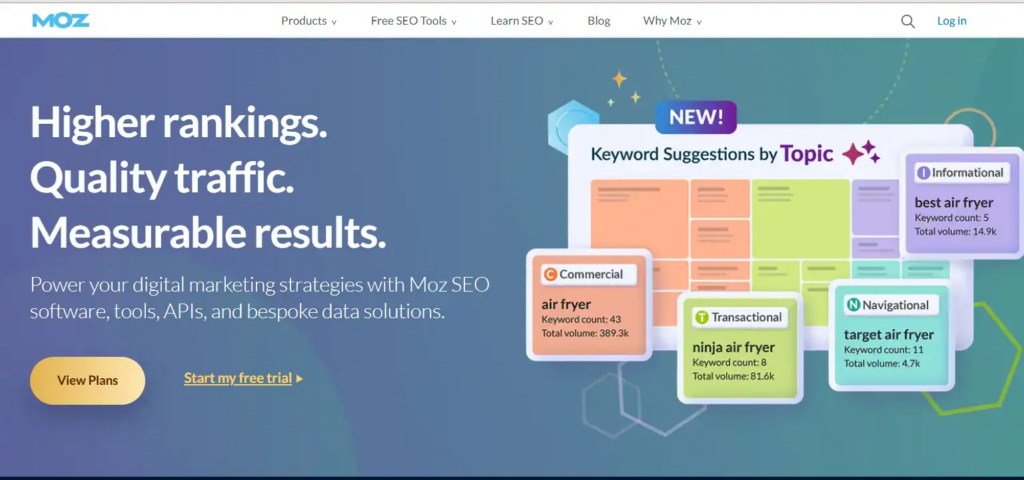
Moz began its journey as SEOMoz, an SEO-focused community and blog, before pivoting into software. Moz Pro, their flagship product, provides a streamlined and user-friendly platform that offers tools for keyword research, site audits, backlink analysis, and more.
Moz is often praised for its simplicity and ease of use, making it an excellent choice for beginners in the SEO world.
Moz’s unique selling point is its Domain Authority (DA), which has become a widely recognized metric for evaluating the authority of a website based on its backlink profile.
Moz’s suite of tools is built around simplicity, making it easy for users to get up and running quickly.
Features Comparison: Semrush Vs Moz
Domain Analysis
When it comes to domain analysis, both tools offer valuable insights into the overall health of your website. However, Semrush stands out with its ability to draw from diverse sources, including clickstream data, which is data collected from users' browsing behavior.
This gives Semrush the upper hand when estimating traffic, even if the actual traffic data isn’t available through direct access to the website's Google Analytics.
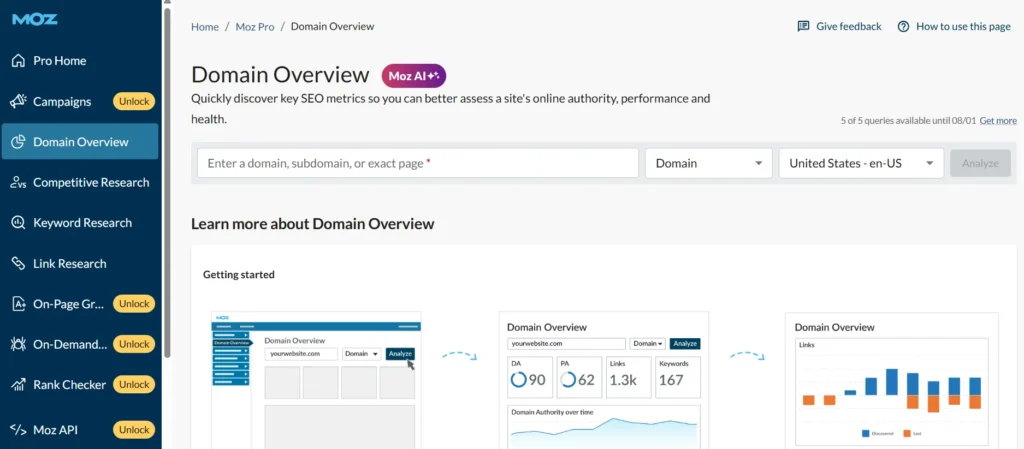
On the other hand, Moz relies primarily on Domain Authority (DA), a metric that simplifies how a site’s backlinks impact its ranking potential. While Moz's DA is a great, easy-to-understand metric, it's not as granular or comprehensive as Semrush’s detailed breakdown.
Semrush allows you to delve deeper into aspects such as site traffic, backlink sources, and competitors’ data, which can help you develop a more strategic SEO plan. Moz, however, is simpler to use, especially for those new to SEO.
Keyword Research
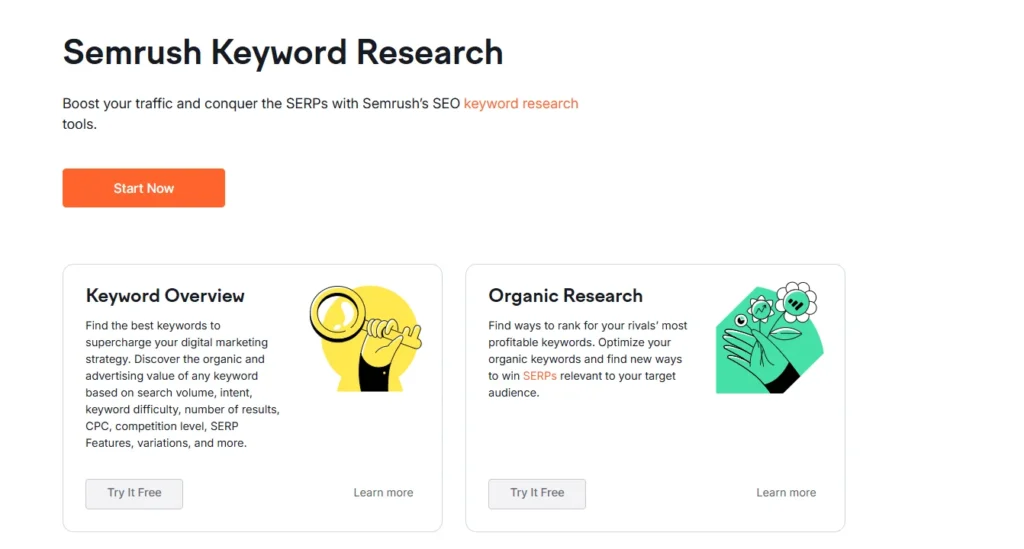
Semrush truly shines when it comes to keyword research, thanks to its massive database of over 25 billion keywords. It provides a Keyword Magic Tool, which is not only robust but allows you to segment keywords based on their intent, competition, and relevance.
You can also filter results based on geographic locations, making it especially useful for international campaigns.
Meanwhile, Moz keeps things a bit simpler with its Keyword Explorer.
While its database is smaller compared to Semrush’s, Moz excels in providing a keyword difficulty score and a priority score to help users decide which keywords are worth pursuing.
It’s designed to make keyword research more approachable for beginners or businesses with simpler needs. So, while Semrush may be a better fit for those with complex or large-scale keyword strategies, Moz offers a streamlined, more digestible approach for users who don’t need a vast keyword list.
On-page SEO
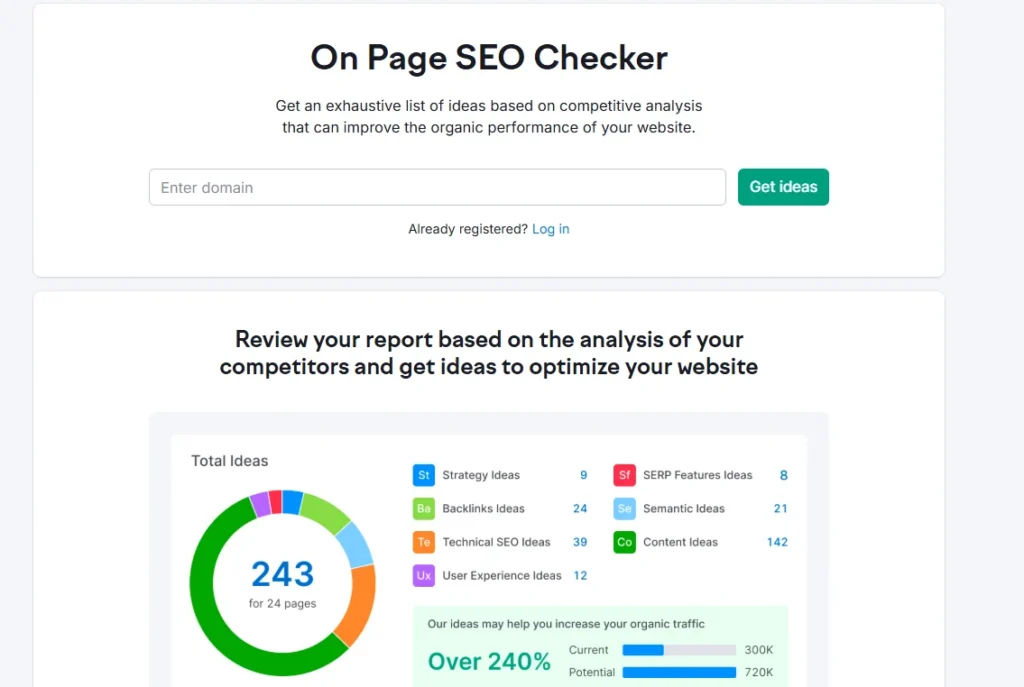
Both tools offer on-page SEO auditing, but Semrush takes a more comprehensive approach. With its Site Audit Tool, you can scan up to 100,000 pages (depending on your plan) and get a full report that includes issues like broken links, slow page speed, duplicate content, and more.
This makes it an excellent tool for larger websites that need an in-depth, bulk audit. Plus, the tool highlights core web vitals (CWV), Google’s new ranking factor that focuses on user experience.
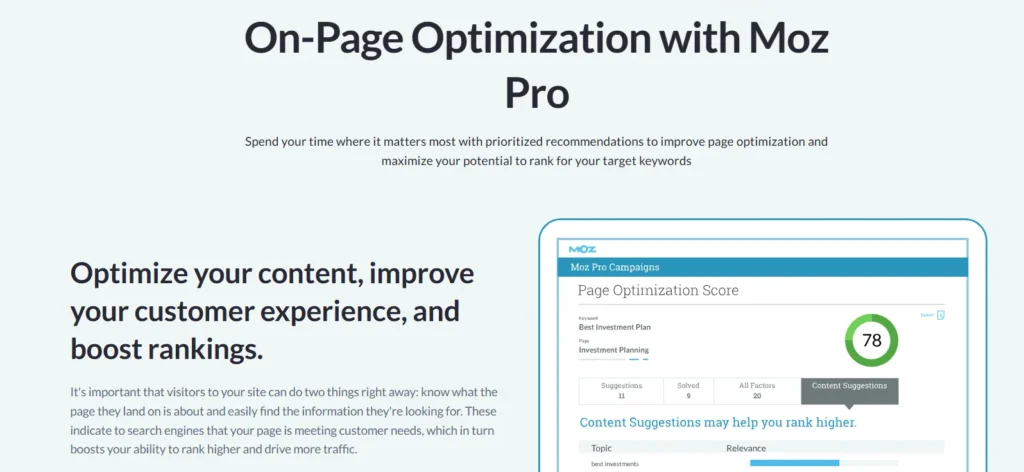
On the other hand, Moz provides a more beginner-friendly tool, the On-Page Grader. It evaluates individual pages based on technical SEO factors like keyword usage, content optimization, and meta tags.
It’s much simpler than Semrush’s bulk analysis, making it a good option for users who only need a basic SEO checkup. Moz does well if you’re managing a smaller site and need to focus on optimizing one page at a time.
Off-page SEO
Off-page SEO is critical for building a backlink profile, and both tools provide comprehensive features for this. Semrush’s Link Building Tool is a standout feature. It allows you to discover new backlink opportunities, track competitors’ backlinks, and even assess the quality of backlinks you’re acquiring.
You can also identify harmful links that may negatively affect your SEO, which is crucial in today’s landscape where toxic links can lead to penalties.
While Moz also provides a Link Explorer tool, it’s more focused on link quality rather than quantity. Moz emphasizes finding high-authority websites to link to you, rather than aiming for a large number of backlinks.
This tool is great for small businesses that want to build a solid, authoritative backlink profile without going overboard.
So, if you’re focused on quality over quantity, Moz has the edge here. If you're managing a larger or more competitive site where you need to scale your link-building efforts, Semrush's tool is more powerful.
Link-Building Tool

Semrush offers an advanced Link Building Tool that is essentially a one-stop shop for everything related to backlinks.
It allows you to find backlink opportunities, track your outreach efforts, and monitor the success of your link-building campaigns.
You can also identify where your competitors are getting their backlinks, giving you insight into potential opportunities you might have missed.
Moz has Link Explorer, which is a fantastic resource for those looking to explore backlinks. Moz focuses on backlink quality, making it ideal for users looking for high-quality, authoritative links.
While Moz doesn't have the extensive outreach tracking features that Semrush offers, Link Explorer remains a solid tool for businesses that want to keep a close eye on their backlink profile without the complexity.
Reporting Features (Paid)
One of Semrush’s strongest points is its robust reporting system. Whether you need reports for your team, clients, or executives, Semrush offers fully customizable reports.
You can create detailed, white-labeled reports that include a wide variety of SEO metrics, such as traffic data, rankings, and backlinks.
This makes it an excellent choice for agencies or anyone who needs to generate comprehensive, branded reports regularly.
In contrast, Moz offers more basic reporting options. While its automated reports for keyword rankings, backlinks, and site audits are helpful, they aren’t as customizable as Semrush’s.
However, Moz keeps things simple, and for many smaller businesses or those with fewer reporting needs, it will suffice. If you’re an agency that needs customizable reports to showcase your work to clients, Semrush will likely be the better option.
Semrush Vs Moz Data Sources
Semrush pulls data from various sources, including clickstream data, which is collected from third-party partners and gives a more comprehensive view of traffic and keyword rankings.
This data allows Semrush to provide accurate traffic estimates and track ranking trends in ways Moz cannot. Semrush also uses its own database to offer keyword and backlink analysis.
In contrast, Moz uses a proprietary index, which, while smaller than Semrush’s, is highly curated. Moz’s data is more reliable for smaller businesses or those just starting with SEO, due to its focus on simplicity and quality over volume.
The key difference here is that Semrush offers a broader set of insights, while Moz provides reliable data, but with a more streamlined focus.
Content Marketing & Traffic
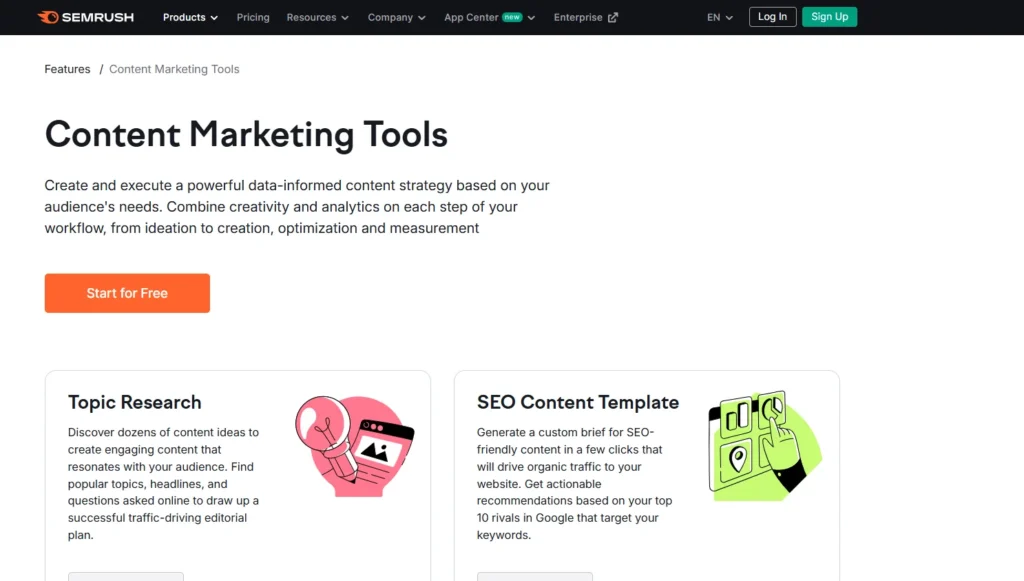
Semrush’s Content Marketing Platform allows you to develop high-quality, SEO-optimized content that attracts organic traffic. You can perform a content audit, identify keyword gaps, and receive recommendations for new topics based on search trends.
Its Topic Research Tool can help you discover what people are searching for in your industry, allowing you to create content that aligns with these interests and drive more traffic, as well as monetize through ads, affiliate links, or products.
On the Other hand, Moz focuses more on simplified keyword research and content suggestions. It helps you understand which keywords are bringing the most organic traffic to your site and provides recommendations for on-page optimization.
Moz can help you increase organic traffic, but it lacks some of the advanced content planning tools Semrush offers.
Pricing Plans Comparison
| Feature | Semrush | Moz |
|---|---|---|
| Pricing | Starts at $117.33/month (Pro Plan) | Starts at $39/month (Starter Plan) |
| Ideal For | Individuals, small businesses, agencies | Small businesses, startups, and medium businesses |
| Keyword Tracking | Up to 5,000 keywords (Business Plan) | Up to 3,000 keywords (Large Plan) |
| Projects/Sites | Up to 40 projects (Business Plan) | Up to 25 tracked sites (Large Plan) |
| Site Audits | Up to 1 million pages (Business Plan) | Up to 5M pages crawled (Large Plan) |
| Content Tools | Extensive content marketing tools (Guru/Business) | Basic content tools (Starter/Medium Plan) |
| Local SEO | Yes (Local Toolkit) | Limited (Basic SEO tools) |
| Advanced Reporting | Yes (Custom reports in Pro and higher plans) | Yes (Branded reports in Medium Plan) |
Semrush Pricing Plans
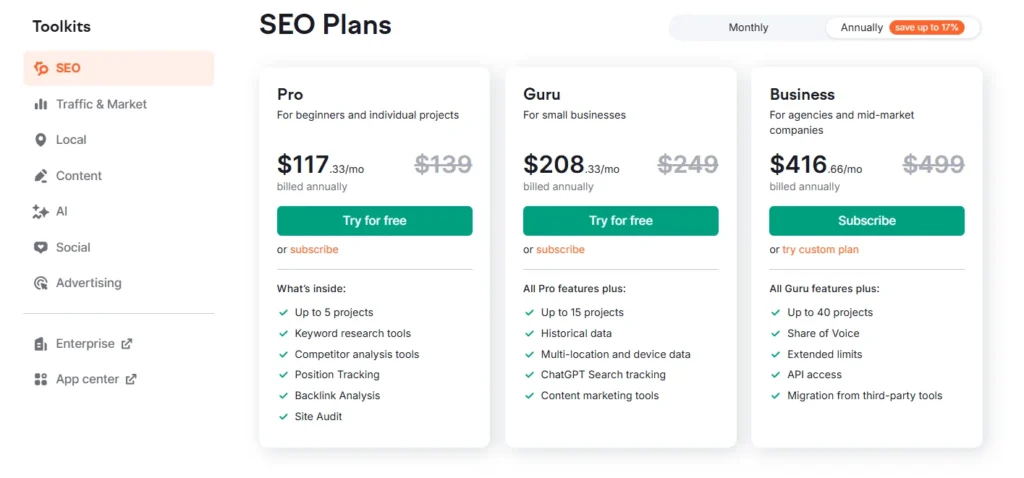
Pro Plan:
- $117.33/month (billed annually)
- Ideal for beginners and individual projects
- Includes keyword research, competitor analysis, backlink analysis, and site audit with up to 5 projects.
Guru Plan:
- $208.33/month (billed annually)
- Perfect for small businesses
- All Pro features plus historical data, multi-location tracking, and content marketing tools.
Business Plan:
- $416.66/month (billed annually)
- Best for agencies and mid-market companies
- Includes all Guru features plus up to 40 projects, Share of Voice tracking, and API access.
Traffic & Market Plans
Pro Plan:
- $289/month (billed annually)
- For data-driven decisions
- Includes traffic overview, daily trends, market monitoring, and competitor insights.
Local Plans
Base Plan:
- $30/month (billed annually)
- For small local businesses
- Includes Google Business Profile optimization and review management with AI
Pro Plan:
- $60/month (billed annually)
- All Base features plus listing management and enhanced review management.
Business Plan:
- Custom pricing
- For large businesses with priority support.
Content Plans
Base Plan:
- $60/month (billed annually)
- Includes content ideas, 10,000 articles/month, and SEO content briefs.
Moz Pricing Plans
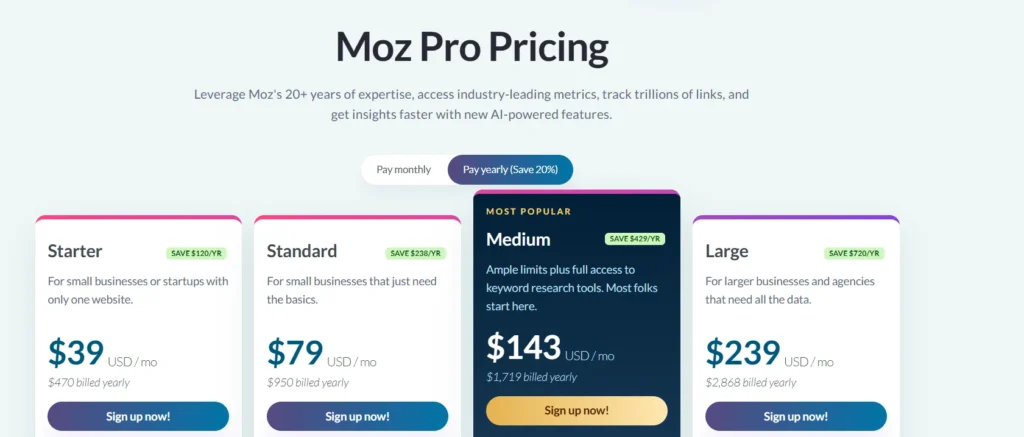
Starter Plan:
- $39/month ($470 billed annually)
- For small businesses with one site
- Includes keyword research, site tracking, and 50 tracked keywords/month.
Standard Plan:
- $79/month ($950 billed annually)
- For small businesses needing basic SEO tools
- Includes 3 sites, 300 tracked keywords, and backlink analysis.
Medium Plan:
- $143/month ($1,719 billed annually)
- Most popular plan
- Includes 10 sites, 1,500 tracked keywords, and branded reports.
Large Plan:
- $239/month ($2,868 billed annually)
- For larger businesses and agencies
- Includes 25 sites, 3,000 tracked keywords, and advanced SEO tools.
Customer Support
Semrush and Moz both offer solid customer support, but in different ways. Semrush provides extensive support, including live chat, email, and phone support for paid users. They also have a Customer Success Team to help with onboarding and getting the most out of the tools.
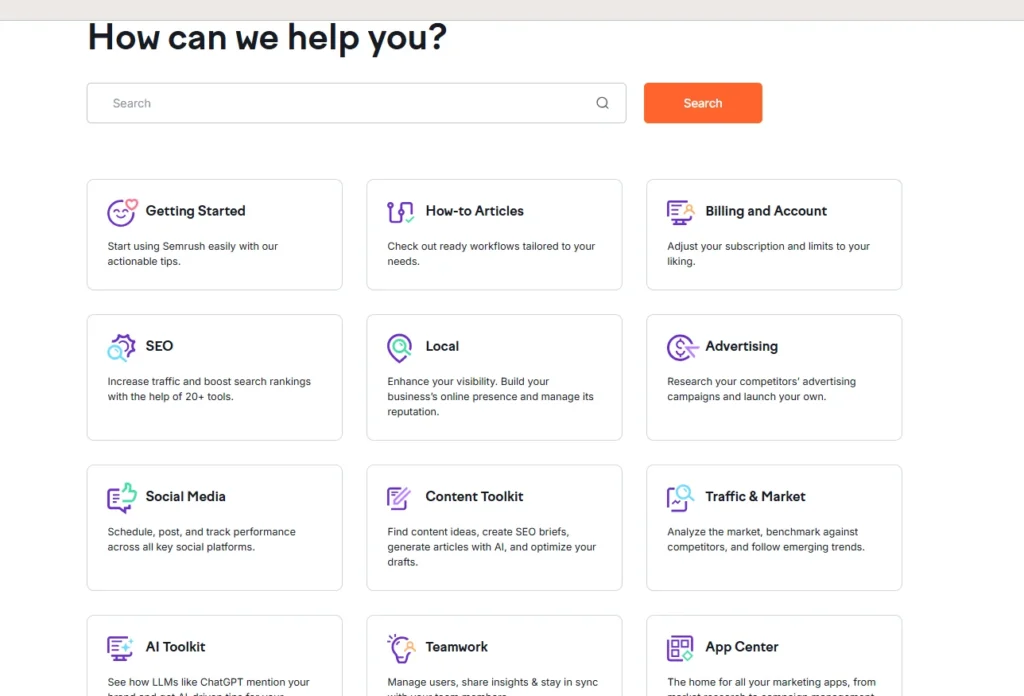
Semrush’s knowledge base and webinars are very helpful, and they offer support in multiple languages and time zones.
Moz, on the other hand, offers a more basic support system. They have a helpful Help Center with articles and FAQs, and an active community forum for user interaction.

Moz offers email support for technical issues but doesn’t provide live chat or phone support like Semrush. They also offer webinars and training for users who want to improve their SEO knowledge.
In short, Semrush has more immediate, hands-on support options, while Moz focuses on self-help resources and community support.
Ease of Use
Semrush and Moz differ significantly in terms of ease of use. Semrush offers a wide range of advanced tools, which can be overwhelming for beginners.
While it provides in-depth data and features, the learning curve is steeper, making it more suitable for experienced users. Once familiar, however, Semrush’s detailed insights are valuable.
Moz, on the other hand, is known for its simplicity and user-friendly interface. It’s ideal for beginners or small businesses as the tools are easy to navigate, with a focus on basic SEO features.
While it lacks some advanced options, Moz’s straightforward experience makes it perfect for users who want an easy start.
In short, Semrush is better for users who need advanced tools and are willing to invest time in learning, while Moz is great for those seeking simplicity and ease of use.
Pros and Cons
Semrush Pros and Cons
Pros
- Offers a wide range of advanced tools for SEO, PPC, content marketing, and competitive analysis.
- In-depth competitor research and keyword tracking.
- Provides detailed reports and insights.
- Excellent for large businesses and agencies.
Cons
- Steep learning curve, especially for beginners.
- Can be overwhelming due to the large number of features.
- Higher pricing compared to some other tools.
Moz Pros and Cons
Pros
- Easy-to-use interface, great for beginners.
- Focused on core SEO tools like keyword research and backlink analysis.
- Affordable pricing plans.
- Excellent community support and educational resources.
Cons
- Fewer advanced features compared to Semrush.
- Limited keyword tracking and site audit capabilities on lower-tier plans.
- Lacks more comprehensive tools for PPC or content marketing.
User Reviews of Semrush Vs Moz
Semrush User Reviews
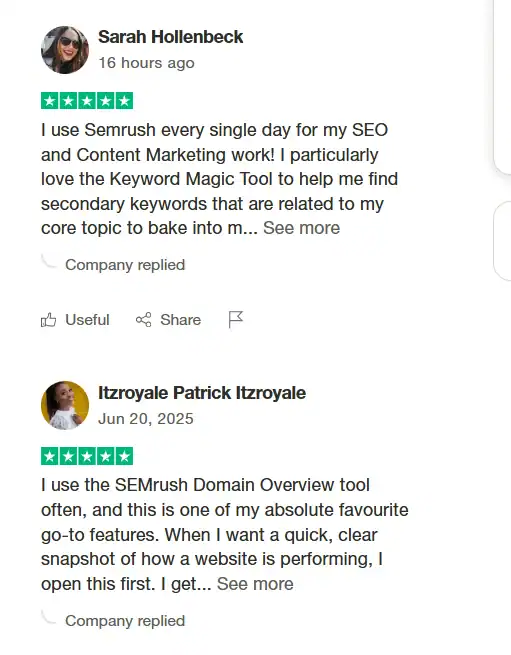
Moz User Reviews
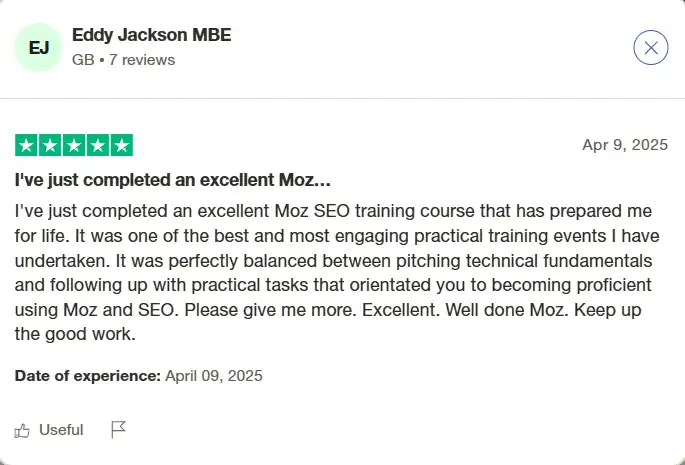
Source: Trustpilot
Which One Should You Choose?
If you’re a beginner or a small business just starting with SEO, Moz is a great choice. It’s easy to use, affordable, and offers the essential tools you need for SEO without feeling overwhelmed. It’s perfect if you want something simple to help you improve your website’s search rankings.
However, if you’re looking for more advanced features or run a larger business or agency, Semrush is the better option. It offers a wider range of tools for SEO, PPC, content marketing, and competitive analysis.
While it may be more complex and pricier, it gives you the detailed data and insights needed to scale your SEO efforts effectively.
Go with Moz if you need something straightforward and easy.
Go with Semrush if you need more powerful, all-in-one tools and are ready to invest time learning them.
Quicklinks:
- Semrush Review: Is This SEO Tool Worth It?
- Moz Free Trial: Get 30 Days Free Trial
- Semrush Free Trial: 14 Days (Guru & Pro)
- Surfer SEO Review: Can It Boost Your Google Rankings?
Wrapping Up
Choosing between Semrush and Moz comes down to your needs. Semrush is perfect for those who need advanced, all-in-one tools for SEO, PPC, and content marketing. It's ideal for larger businesses or agencies that can handle its complexity.
Moz is simpler and more beginner-friendly, making it great for small businesses or anyone just starting with SEO. It covers essential tasks like keyword research and backlink analysis without overwhelming you.
In the end, if you need depth and scalability, Semrush is the way to go. If you want something easy and affordable, Moz is your best choice. Both are great tools just choose what fits your needs best.

